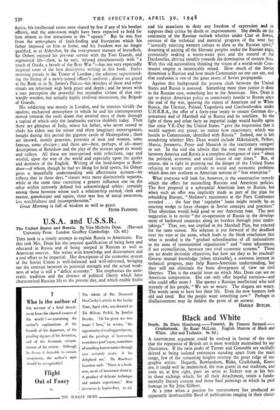U.S.A. and U.S.S.R.
The United States and Russia. By Vera Micheles Dean. (Harvard University Press. London: Geoffrey Cumberlege. 12s. 6d.) The United States and Russia. By Vera Micheles Dean. (Harvard University Press. London: Geoffrey Cumberlege. 12s. 6d.) Tins book is a timely attempt to explain'Russia to Americans. For this task Mrs. Dean has the unusual qualification of being born and educated in Russia and of being steeped in Russian as well as American sources. She writes with knowledge and discernment and a real effort to be impartial. Her description of the economic system of the Soviet Union is well-balanced and well-informed, bringing out the contrast between its potential strength and the actual weak- ness of what is still a "deficit economy." She emphasises the auto- cratic tradition and the absence of political liberty which have characterised Russian life to the present day, and which enable Stalin and his associates to deny any freedom of expression and to suppress their critics by death or imprisonment. She dwells on the continuity of the Russian outlook whether under Czar or Soviet, envious of the technical and material progress of the west but "inwardly rejecting western culture as alien to the Russian spirit," dreaming of uniting all the Slavonic peoples under the Russian aegis, perennially seeking a warm-water port and the control of the Dardanelles, driving steadily towards the domination of eastern Asia. With this old nationalistic thinking the vision of a world-wide Com- munist empire is inextricably mixed. How -much of the Soviet dynamism is Russian and how. much Communist no one can say, and that confusion is one of the great assets of Soviet propaganda.
Against this background the present clash between the United States and Russia is assessed. Something more than justice is done to the Russian case, something less to the American. Mrs. Dean is apt to depict American policy as consistently hostile to Russia since the end of the war, ignoring the extent of American aid to White Russia, the Ukraine, Poland, Yugoslavia and Czechoslovakia under U.N.R.R.A., the offer of a forty-year treaty to ensure German dis- armament and of Marshall aid to Russia and its satellites. In the light of these and other facts an impartial judge would hardly agree that since V.E.-Day the United States "gave the impression that it would support any group, no matter how reactionary, which was hostile to Communism, identified with Russia." Indeed, one is left wondering whether Mrs. Dean would include Mikolajczyk, Petkov, Maniu, Jovanovic, Peyer and Masaryk in the reactionary category or not. In the end she admits that the real root of antagonism between America and Russia is a complete divergence of view "about the political, economic and social issues of our times." But, of course, she is right in pointing out the danger of the United States refusing to accept any attitude to social and economic problems which does not conform to American notions of "free enterprise."
What everyone will look for, however, is the constructive remedy which she offers for reconciling Russian and American policies. The first proposal is a substantial American loan to Russia, but when such an offer was implicitly made as part of the plan for rebuilding Europe, " Molotov's statements at the Paris Conference revealed . . . the fear that ' capitalist ' loans might merely be an entering wedge to fox cc changes in Soviet concepts and practices." That objection would hold good to any American loan. The next suggestion is to invite "the co-operation of Russia in the develop- ment of backward countries, along its borders through joint under- takings." That, too, was implied in the Marshall Plan, but rejected for the same reason. No solution is put forward of the deadlock over the veto or the atom, which leads to the bleak conclusion that what is needed is the "gradual subordination of all nationalisms to the aims of international organisation" and "some adjustment, if not reconciliation, between two rival economic systems." Those are no doubt desirable objectives, but how are they to be reached? Greater mutual knowledge (when attainable), a common interest in technical progress, may help Russo-American understanding, but they will not eliminate the basic divergences of view on civil liberties. That is the crucial issue on which Mrs. Dean can see no American compromise. She can only offer hopeful surmises—and who could offer more ? She quotes a Russian intellectual who said recently of his people, "We are so weary. The slogans are weary. The words seem to have lost their life. Even the new banners look old and tired. But the people want something new." Perhaps in disillusionment may lie hidden the germ of an answer.
HAROLD BumEn.






























 Previous page
Previous page